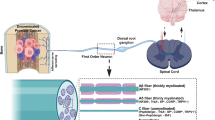Abstract
It is of clinical importance to control pain in the management of patients with endocrine-therapy-refractory prostate cancer. To evaluate factors influencing the manifestation of pain and the relationship between characteristics of pain and prognosis, patients with pain from bone metastasis were analyzed. A total of 48 patients with endocrine-therapy-refractory prostate cancer, who showed progression of bone metastasis and were followed-up until death, comprised the present study. The patients were divided into three groups according to the grade of pain: no need for analgesics, a need for non-opioid analgesics, and a need for opioid analgesics. The time interval between the diagnosis of the endocrine-therapy-refractory state and the requirement for analgesics was estimated. Survivals from the endocrine-therapy-refractory state were calculated according to the grade of pain or the time interval to requirement for analgesics. In addition, the extent of disease, the doubling time of tumor markers at the refractory state, any change of alkaline phosphatase, and other prognostic factors were examined in relation to pain. All 22 endocrine-therapy-resistant cases at initial treatment and 18 of 26 (69%) relapsed cases required analgesics during the clinical course until death. No difference in survival was observed between the grades of pain. The patients who needed analgesics within 1 year after becoming refractory to endocrine therapy showed significantly shorter survival than those without or with analgesics more than 1 year later. Although the time elapsing before analgesics were needed was not related to the extent of disease, the patients who showed a shorter doubling time for tumor markers and/or an exponential increase in alkaline phosphatase tended to require analgesics within 1 year. In endocrine-therapy-refractory prostate cancer, the early requirement for analgesics suggests poor prognosis, and the onset of pain may be attributable not to the extent of the disease but rather to the rapid expansion of bone metastasis.
Similar content being viewed by others
Abbreviations
- PAP :
-
prostatic acid phosphatase
- PSA :
-
prostate-specific antigen
References
Akimoto S, Ohki T, Akakura K, Masai M, Shimazaki J (1994) Chemotherapy for endocrine therapy-refractory prostate cancer. Cancer Chemother Pharmacol 35:18–22
Akimoto S, Masai M, Akakura K, Shimazaki J (1995) Tumor marker doubling time in patients with prostate cancer: determination of prostate-specific antigen and prostatic acid phosphatase doubling time. Eur Urol 27:207–212
Bruchovsky N (1993) Androgens and antiandrogens. In: Holland JF, Frei E III, Bast RC Jr, Kufe DW, Morton DJ, Weichselbaum RR (eds) Cancer medicine. Lea & Febiger, Philadelphia, pp 884–896
Cherny NI, Portenoy RK (1993) Cancer pain management. Current strategy. Cancer 72:3393–3415
Cox DR (1972) Regression models and life tables. J R Statist Soc 34:187–220
D'Amico AV, Hanks GE (1993) Linear regressive analysis using prostate-specific antigen doubling time for predicting tumor biology and clinical outcome in prostate cancer. Cancer 72:2638–2643
Galasko CSB (1982) Mechanisms of lytic and blastic metastatic disease of bone. Clin Orthop 169:20–27
Gleason DF (1966) Classification of prostatic carcinomas. Cancer Chemother Rep 50:125–136
Herr HW, Kornblith AB, Ofman U (1993) A comparison of the quality of life of patients with metastatic prostate cancer who received or did not receive hormonal therapy. Cancer 71:1143–1150
Kaplan EL, Meier P (1958) Nonparametric estimation from incomplete observations. J Am Statist Assoc 53:457–481
Kuriyama M, Atkimoto S, Akaza H, Arai Y, Usami M, Imai K, Tanaka Y, Yamazaki H, Kawada Y, Koiso K, Yoshida O, Kotake T, Yamanaka H, Machida T, Aso Y, Shimazaki J (1992) Comparison of various assay systems of prostate-specific antigen for standardization. Jpn J Clin Oncol 22:393–399
Murphy GP, Natarajan N, Pontes JE, Schmitz RL, Smart CR, Schmidt JD, Mettlin C (1982) The national survery of prostate cancer in the United States by the American College of Surgeons. J Urol 127:928–934
Payne R (1993) Pain management in the patient with prostate cancer. Cancer 71:1131–1137
Portenoy RK, Miransky J, Thaler HT, Hornung J, Bianchi C, Cibas-Kong I, Feldhamer E, Lewis F, Matamoros I, Sugar MZ, Olivieri AP, Kemeny NE, Foley KM (1992) Pain in ambulatory patients with lung or colon cancer. Prevalence, characteristics, and effect. Cancer 70:1616–1624
Portenoy RK, Kornblith AB, Wong G, Vlamis V, Lepore JM, Loseth DB, Hakes T, Foley KM, Hoskins WJ (1994) Pain in ovarian cancer patients. Prevalence, characteristics, and associated symptoms. Cancer 74:907–915
Schmid H-P, McNeal JE, Stmey TA (1993) Observations on the doubling time of prostate cancer. The use of serial prostate-specific antigen in patients with untreated disease as a measure of increasing cancer volume. Cancer 71:2031–2040
Schmidt JD, Mettlin CJ, Natarajan N, Peace BB, Beart RW Jr, Winchester DP, Murphy GP (1986) Trends in patterns of care for prostatic cancer, 1974–1983: results of surveys by the American College of Surgeons. J Urol 136:416–421
Silva FC da, Reis E, Costa T, Denis L, the members of Quality of Life Committee of the EORTC Genitourinary Group (1993) Quality of life in patients with prostatic cancer. A feasibility study. Cancer 71:1138–1142
Smith JA Jr (1987) New methods of endocrine management of prostatic cancer. J Urol 137:1–10
Soloway MS, Hardeman SW, Hickey D, Raymond J, Todd B, Soloway S, Moinuddin M (1988) Stratification of patients with metastatic prostatic cancer based on extent of disease on initial bone scan. Cancer 61:195–202
Surya BV, Provet JA (1989) Manifestation of advanced prostate cancer: prognosis and treatment. J Urol 142:921–928
Tong D, Gillick L, Hendrickson FR (1982) The palliation of symptomatic osseous metastases. Final results of the study by the radiation therapy oncology group. Cancer 50:893–899
World Health Organization (1990) Cancer pain relief and palliative care: report of a WHO expert committee. World Health Organization, Geneva
Author information
Authors and Affiliations
Additional information
This work was supported in part by a Grant-in Aid from the Ministry of Health and Welfare, Japan (5–10)
Rights and permissions
About this article
Cite this article
Akakura, K., Akimoto, S. & Shimazaki, J. Pain caused by bone metastasis in endocrine-therapy-refractory prostate cancer. J Cancer Res Clin Oncol 122, 633–637 (1996). https://doi.org/10.1007/BF01221197
Received:
Accepted:
Issue Date:
DOI: https://doi.org/10.1007/BF01221197




